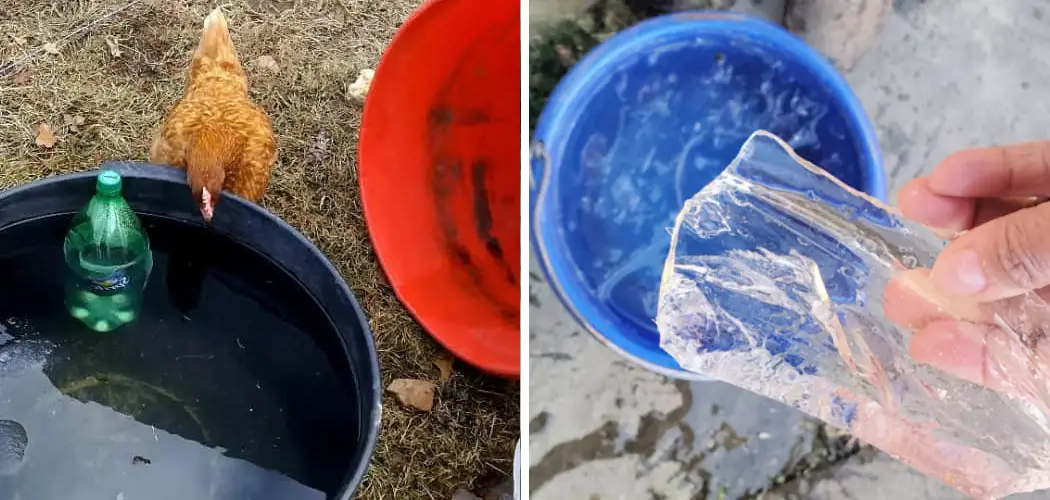Ensuring your chickens have access to liquid water during the colder months is a crucial aspect of poultry care that many first-time chicken keepers might underestimate. When temperatures drop below freezing, water sources can quickly turn to ice, leaving your flock without essential hydration.
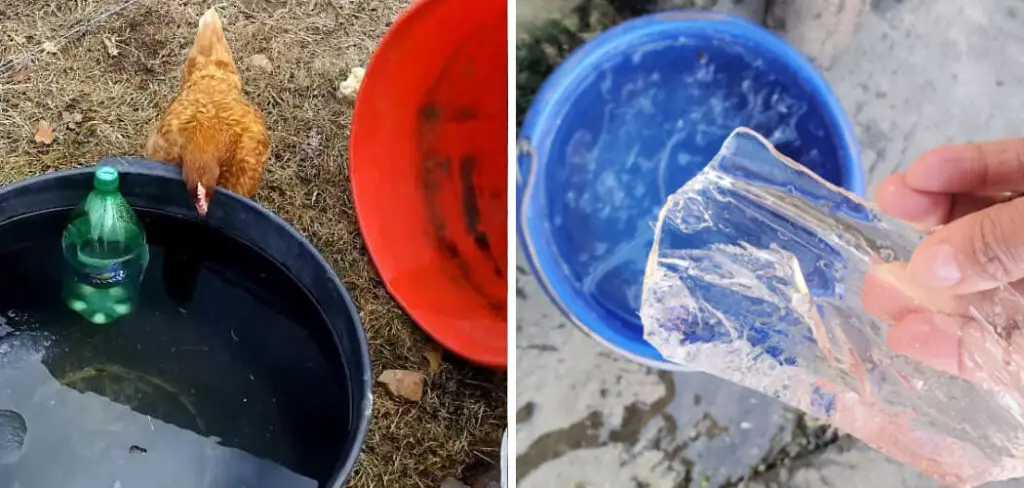
Dehydration in chickens can lead to a host of health issues, including reduced egg production and increased vulnerability to illness.
This guide on how to keep water from freezing for chickens aims to offer practical and effective solutions for keeping water from freezing in your chicken coop, ensuring your birds stay hydrated and healthy throughout the winter season.
What is the Freezing Point of Water?
Before we dive into tips and tricks for keeping your chickens’ water from freezing, it’s essential to understand the science behind why water freezes in the first place. The freezing point of water is 32°F (0°C). This means that at this temperature, liquid water will turn to ice. However, several factors can influence the freezing point of water, such as impurities, altitude, and agitation.
But why is this important to know for chicken care? Well, if you’re aware of the freezing point of water, you can implement strategies to prevent your chickens’ water from reaching this temperature and turning to ice.
Why is it Important to Keep Water From Freezing for Chickens?
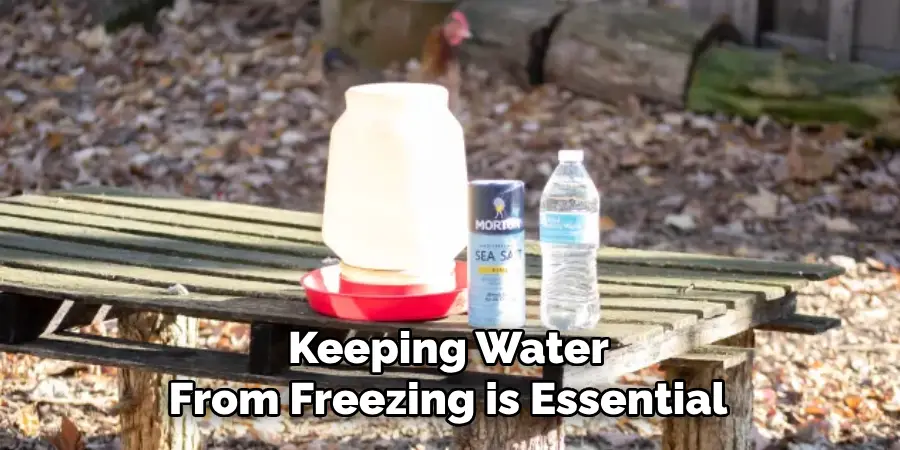
As mentioned earlier, dehydration in chickens can lead to several health issues. But keeping water from freezing is essential for more reasons than just preventing dehydration. During the winter months, chickens’ bodies work harder to keep warm, burning more energy and requiring more food and water intake.
If their water source freezes over, they may not be able to consume enough water, resulting in decreased egg production and potential weight loss.
Moreover, chickens also need water for other bodily functions, such as regulating body temperature and metabolizing food. Without access to liquid water, these processes can be compromised, making your chickens more susceptible to illnesses.
You might also be wondering, can’t chickens just eat snow for hydration? While they may consume small amounts of snow, it’s not an adequate substitute for liquid water. Snow is mostly air and does not provide the necessary hydration that liquid water does.
Things to Consider Before Preventing Water From Freezing:
Before implementing any strategies to keep your chickens’ water from freezing, there are a few things to consider. Firstly, the size of your flock and the number of water sources available should be taken into account. A larger flock will require more water and may need multiple sources to ensure everyone has access.
Secondly, the climate in your area plays a significant role in how quickly water freezes. If you live in an area with harsh winters and frequent below-freezing temperatures, you may need to take additional measures to prevent water from freezing.
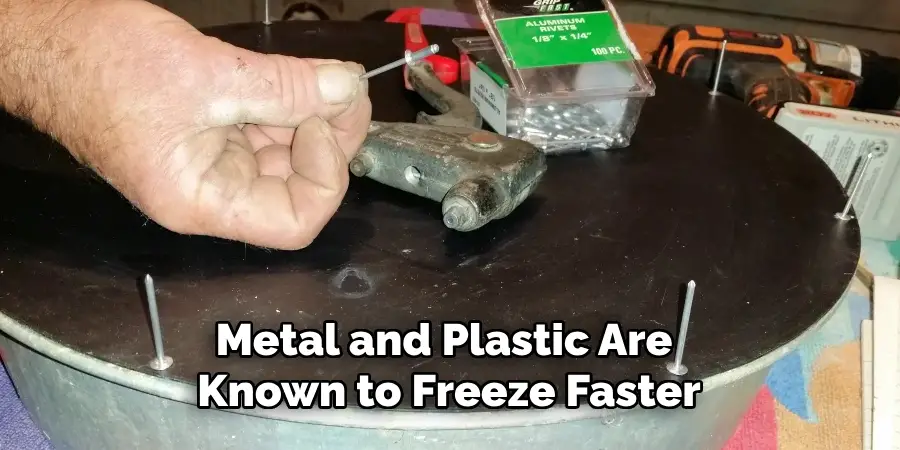
Lastly, the type of water source you use can also impact how quickly it freezes. Metal and plastic are known to freeze faster than other materials, such as rubber or ceramic. Consider using different types of waterers or adding insulation to your current ones for better results.
11 Step-by-step Guidelines on How to Keep Water From Freezing for Chickens:
Step 1: Invest in a Heated Waterer
One of the most effective solutions for keeping water from freezing is to invest in heated water. These specialized waterers are designed to prevent the water from reaching freezing temperatures, ensuring your chickens have access to liquid water even during colder months.
You can find heated waterers at most farm supply stores or online. They come in various sizes and designs, so be sure to choose one that suits your flock’s needs. The initial cost may seem expensive, but it’s a worthwhile investment in the long run.
Step 2: Use a De-Icer
If buying a heated waterer isn’t an option, another alternative is to. De-icers are small heating elements that can be placed in your existing waterer to prevent the water from freezing. They are more affordable than heated waterers and can be found at most farm supply stores or online.
The downside is that they may not be as effective in extremely cold temperatures. You’ll also need a power source near your coop to plug in the de-icer. It’s essential to regularly check the de-icer and ensure it’s functioning correctly.
Step 3: Install a Submersible Heater
If you have a large water source, such as a trough or pond, consider installing a submersible heater. These heaters are specifically designed to keep large bodies of water from freezing.
They can be costly, but they are an excellent long-term solution for keeping water from freezing in larger flocks. The downside is that they require a power source, which may not be feasible for all coops. You’ll also need to monitor the heater and ensure it’s functioning correctly.
Step 4: Use Insulation
Insulating your water is another effective way to keep water from freezing. You can use various materials such as foam, straw, or even old blankets to wrap around your waterer. This insulation will help retain heat and prevent the water from reaching freezing temperatures. It’s essential to regularly check the insulation and replace it if it gets wet or damaged.
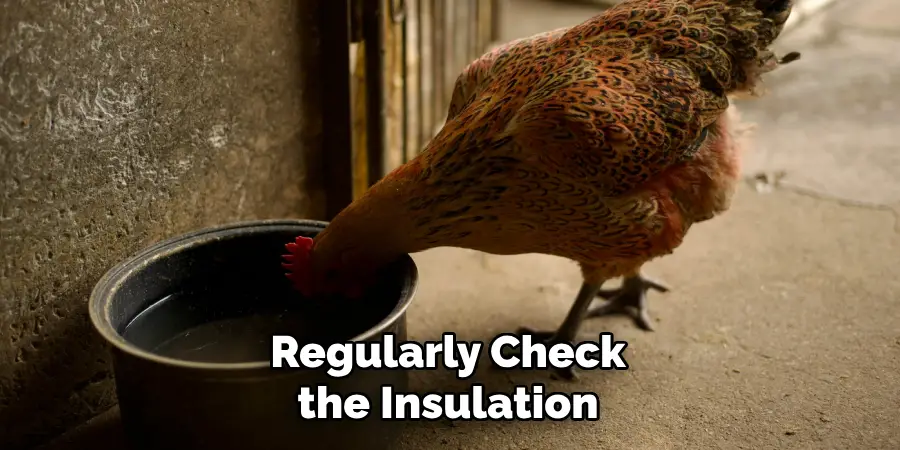
Step 5: Keep Waterers Clean
Dirty waterers can freeze faster, so it’s crucial to keep them clean. Regularly change the water and scrub the water to remove any debris or bacteria. This will also help prevent your chickens from getting sick. The cleaner your waterer, the more effective it will be in preventing freezing. You can also add a few drops of apple cider vinegar to the water to help prevent algae growth, which can contribute to freezing.
Step 6: Use Warm Water
During extremely cold weather, you can pour warm (not hot) water into your chickens’ water to help prevent it from freezing. This will provide temporary relief until you can implement a more permanent solution. The downside is that you may need to refill the water frequently as it cools down and potentially freezes.
But it’s a quick and easy fix in a pinch. It’s essential to use warm, not hot, water, as it can damage your chickens’ crops if they consume too much. The water should also not be too cold, as it can shock them and cause health issues.
Step 7: Elevate Waterers
Sometimes, waterers placed directly on the ground can freeze faster due to the cold ground temperatures. By elevating your waterer off the ground, you can slow down the freezing process. You can use cinder blocks or bricks to create a platform for your waterer to sit on. This will also help prevent the water from getting dirty and freezing as quickly as possible. But be mindful of any potential hazards, such as predators being able to access the water.
Step 8: Use Solar Power
If you have a power source near your coop, consider using solar-powered heated waterers or de-icers. These are environmentally friendly options that use the sun’s energy to keep the water from freezing.
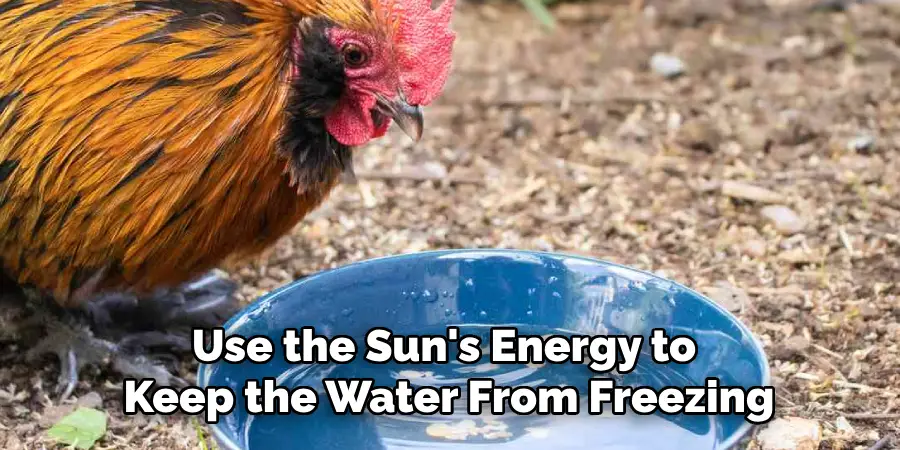
They may not be suitable for extremely cold climates or larger flocks, but they can be a viable solution for smaller flocks or during mild winters. The initial cost may be more expensive, but you’ll save on electricity in the long run. You can also use a solar-powered battery charger to power your existing heated waterer or de-icer.
Step 9: Add Salt
Another quick fix for preventing water from freezing is to add salt to the water. The salt reduces the freezing point by one degree for every 50 pounds added. However, be cautious about using too much salt as it can cause health issues for your chickens if consumed excessively.
It’s best to consult with a veterinarian before using this method. You can also use sand instead of salt, which won’t harm your chickens if ingested.
Step 10: Monitor Water Consumption
It’s essential to monitor your flock’s water consumption during colder months. Frozen waterers can lead to dehydration and other health issues for your chickens. If you notice a significant decrease in water consumption, it’s a sign that your water may be freezing.
Check the water and implement a solution immediately to prevent any potential health problems. The key is to stay proactive and ensure your chickens have access to clean, liquid water at all times.
Step 11: Rotate Waterers
Finally, consider having multiple waterers and rotating them regularly during colder months. This will ensure your chickens always have access to liquid water while you can focus on thawing and cleaning the other waterers. It’s also a good idea to have backup options in case one of your methods fails. By rotating waterers, you can prevent freezing and keep your flock happy and healthy all winter long.
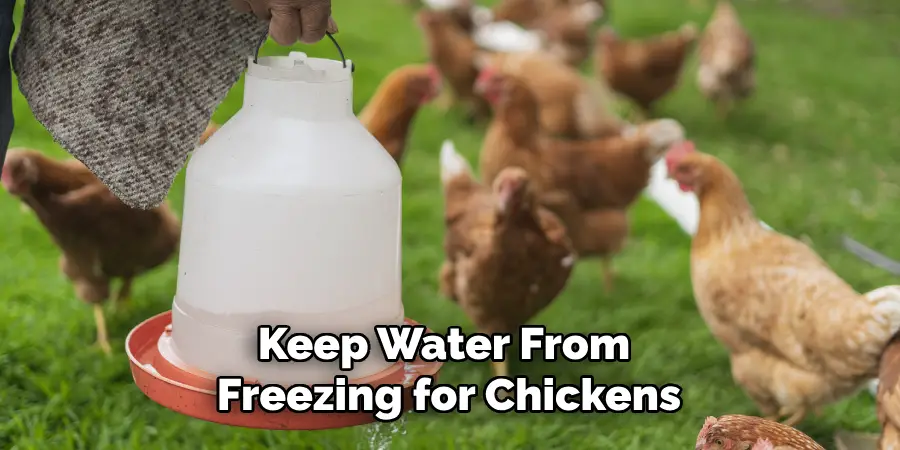
Following these steps on how to keep water from freezing for chickens will ensure that your chickens always have access to clean, liquid water during colder months. It’s a worthwhile investment in the long run as it can prevent health issues and even increase egg production.
Remember to stay vigilant and regularly check your waterers to prevent any potential problems. Keeping your chickens hydrated is crucial for their overall well-being, and implementing these solutions will help you achieve that goal. Enjoy a worry-free winter with these tips for keeping your chicken’s water from freezing. Happy farming!
Tips for Keeping Water From Freezing for Chickens
Now that we understand the importance of keeping chickens’ water from freezing, let’s explore some practical and effective ways to achieve this.
Use a Heated Waterer:
Investing in heated water is perhaps the most convenient and reliable method of preventing water from freezing. These devices are designed specifically for winter use, with built-in heating elements that keep the water at a constant temperature above freezing.
Insulate Your Waterer:
If you prefer not to invest in a heated waterer, you can insulate your existing waterer to keep it from freezing. You can use materials such as bubble wrap, newspaper, or even old towels to create an insulated layer around the waterer. Just make sure to replace the insulation regularly if it gets wet.
Use Solar Heaters:
If you have a chicken coop that receives ample sunlight, using a solar heater can be an environmentally friendly and cost-effective option for keeping your chickens’ water from freezing. These devices use the sun’s energy to heat the water, making them ideal for areas with milder winters.
Keep Water Moving:
Water is less likely to freeze if it’s moving, so keeping your chickens’ water moving can be an effective way to prevent freezing. You can do this by using a small fountain or adding a few ping pong balls to the water, which will create enough agitation to keep it from freezing over.
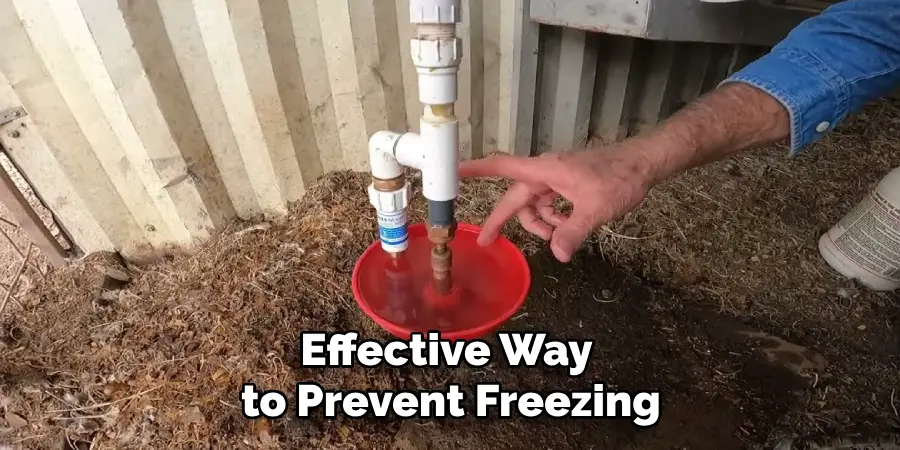
Use a Stock Tank Heater:
For larger flocks or homesteads with multiple animals, a stock tank heater can be an excellent solution for keeping water from freezing. These devices are designed to keep livestock water tanks unfrozen and can also work well for chicken waterers. Just make sure to choose the right size for your specific needs.
Frequently Asked Questions
Q: How Often Should I Check and Refill My Waterer During Winter?
A: It’s best to check and refill your water at least twice a day during the colder months. This will ensure that your chickens always have access to clean, liquid water. The frequency may vary depending on the size of your flock and weather conditions, so it’s essential to monitor their water consumption regularly. It’s also a good idea to check the water before bedtime and first thing in the morning.
Q: Can I Use Electric Heaters or Heat Lamps to Keep Water From Freezing?
A: While these methods may seem convenient, they can be dangerous and potentially start fires. It’s best to avoid using any heating equipment that wasn’t specifically designed to keep water from freezing. The safest and most effective option is to invest in a heated waterer or use the alternative methods mentioned above. You can also consult with a professional or veterinarian for more advice on safe heating options for your coop.
Q: Is It Necessary to Warm Up Water Before Giving it to Chickens?
A: No, you don’t need to warm up water before giving it to chickens. They are adaptable creatures and can handle drinking cold water, as long as it’s not frozen. However, it’s essential to prevent water from freezing as it can lead to dehydration and other health issues. The key is to provide access to clean, liquid water at all times.
Q: Can I Use Hot Water to Thaw a Frozen Waterer?
A: It’s not recommended to use hot water to thaw a frozen waterer as it can cause the plastic to crack or break. Instead, try using warm water and gradually increase the temperature until the ice melts. You can also use a hairdryer or heat gun on a low setting to thaw the waterer, but be cautious not to overheat and damage it. The best prevention method is to regularly monitor and prevent waterers from freezing in the first place.
Q: What Other Measures Can I Take to Keep My Chickens Warm in Winter?
A: Aside from keeping their water from freezing, there are several other measures you can take to keep your chickens warm during winter. These include providing adequate shelter and bedding, insulating their coop, ensuring proper ventilation, and increasing their feed intake. It’s also a good idea to check on them frequently and make any necessary adjustments to their environment.
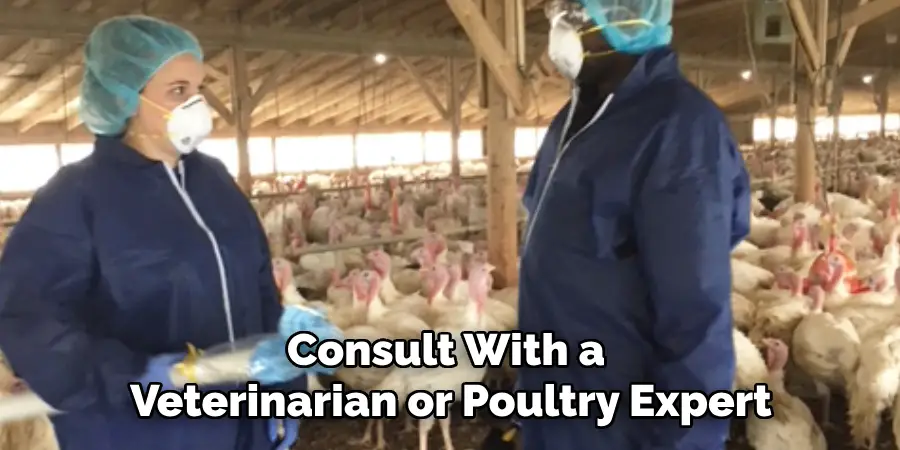
Consult with a veterinarian or poultry expert for more personalized advice on keeping your flock warm in winter.
Overall, ensuring your chickens have access to clean, liquid water during colder months is crucial for their health and well-being. By following these tips and taking preventative measures, you can keep your flock hydrated and happy all winter long. Stay vigilant, stay informed, and enjoy a worry-free winter with your feathered friends! Happy farming!
Conclusion
In conclusion, ensuring your chickens have access to liquid water during the colder months is crucial for their health and well-being. By understanding the freezing point of water and implementing practical solutions like using heated waterers, insulating existing waterers, or utilizing solar heaters, you can prevent your chickens’ water from freezing and keep them happy and healthy throughout the winter season.
With these tips on how to keep water from freezing for chickens in mind, you can confidently care for your flock all year round! So, it’s important to follow these methods to keep your chicken’s water from freezing and ensure they stay hydrated and healthy during the colder months. Remember, a well-hydrated flock is a happy and productive flock!
So, make sure to regularly check and maintain their water source to provide the best care for your feathered friends. Happy chicken keeping!
About
Outdoor Fixes is a distinguished figure in the world of Diy design, with a decade of expertise creating innovative and sustainable Diy solutions.
His professional focus lies in merging traditional craftsmanship with modern manufacturing techniques,
fostering designs that are both practical and environmentally conscious. As the author of diy,
outdoorfixes delves into the art and science of outdoorfixes-making, inspiring artisans and industry professionals alike.
Education RMIT University
(Melbourne, Australia) Associate Degree in Design (Outdoor Fixes) Focus on sustainable design, industry-driven projects,
and practical craftsmanship. Gained hands-on experience with traditional and digital manufacturing tools, such as CAD and CNC software.
Nottingham Trent University
(United Kingdom) Bachelor’s in outdoorfixes.com and Product Design (Honors) Specialized in product design with a focus on blending creativity with production
techniques. Participated in industry projects, working with companies like John Lewis and Vitsoe to gain real-world insights.
Publications and Impact
In diy, Outdoor Fixes his insights on indoor design processes, materials, and strategies for efficient production.
His writing bridges the gap between artisan knowledge and modern industry needs, making it a must-read for both budding designers and seasoned professionals.

